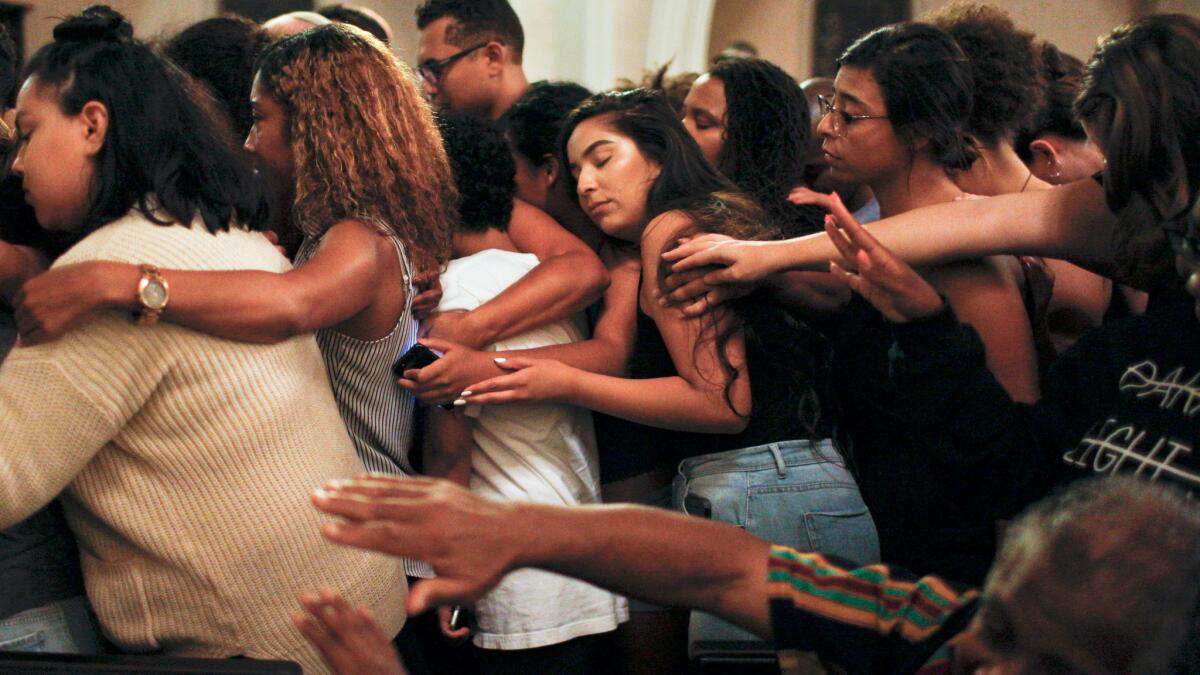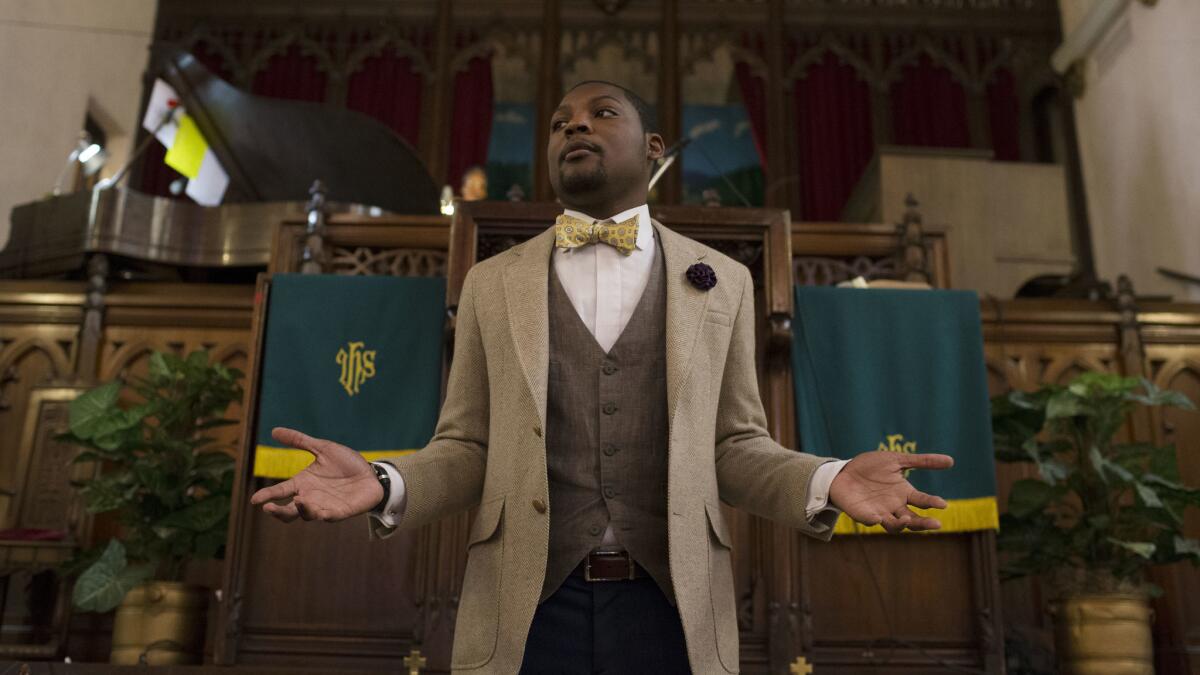Why the bedrocks of L.A.’s civil rights movements won’t embrace Black Lives Matter

The McCarty Memorial Christian Church holds a gathering centered around poetry and prayer for the Black Live Matter movement.
- Share via
For decades, they’ve been catalysts for civil rights activism, occupying an important niche at the center of protests over police misconduct and racial flashpoints in Los Angeles, from the Rodney J. King beating to the murder trial of O.J. Simpson.
But some black churches in Los Angeles, and the traditional African American clergy who lead them, have kept a decided distance from the new breed of activism represented by the Black Lives Matter movement.
Many church leaders have been cool to the brash, in-your-face tactics of Black Lives Matter. Ministers have spoken out forcefully about the way blacks are treated by police, but few have openly supported the group. For their part, Black Lives Matter organizers have turned to street protests and social media to get their message out rather than relying on the pulpit.

In many ways, the division is generational. Black Lives Matter is a young movement, while many black churches tend to cater to older parishioners. But there are also political differences.
Pastor J. Edgar Boyd of First African Methodist Episcopal Church — the oldest black congregation in L.A. — said Black Lives Matter “is a tremendous force that is … lacking of the kind of direction that it needs to have.”
He cited protesters who confronted Mayor Eric Garcetti last year at Holman United Methodist Church. More recently, Black Lives Matter protesters staged a sit-in outside City Hall to demand the removal of L.A. Police Chief Charlie Beck.
“The black church, or at least the faith-based community, has not embraced Black Lives Matter because it doesn’t seem to have that central direction where people of responsibility can make the decisions and 99% can follow that,” Boyd said.
James I. Jones Jr., known as the Rev. JJ, heads Gangstas for Christ and is the facilitator of the Watts Gang Task Force. He said he supports the Black Lives Matter movement but disagrees with the L.A. chapter’s mission to fire Beck and remove Matt Johnson as the president of the Police Commission.
”We’ve come a long way,” Jones added. “Right now, in L.A. I would be more concerned with my grandson getting dressed to go to a party and somebody who looks like him from a different area ask him ‘What set you from?’ than worrying about if police are going to kill my grandson.”
Black Lives Matter activists have made Beck a persistent target, holding protests demanding his dismissal. But the chief has retained the support of many veteran African American leaders, including some who have battled with the L.A. Police Department in the past.
Civil rights lawyer Connie Rice, who sued the department multiple times, said the LAPD deserves credit for diversifying its force and treating minority groups better than it did in the past.
“We took paramilitary police and we took them 180 degrees,” said Rice, who worked with Beck to train several LAPD units that patrol low-income communities.
Black Lives Matter formed in 2013 after a jury acquitted George Zimmerman, a Florida man, in the death of unarmed black teenager Trayvon Martin. Protesters channeled their frustration with the verdict into a movement that galvanized millennials.
Rice praised the group for keeping pressure on police and pushing the issue of injustice to the forefront, even though she doesn’t always agree with the comments of some its activists.
“We have a long way to go before most poor neighborhoods see LAPD through the lens of trust and guardianship,” Rice said.
Some experts say this divide extends beyond Los Angeles.
Robin D.G. Kelley, a UCLA history professor, said Black Lives Matter has “taken a conscious stance against what they call ‘respectability politics,’ which is associated with mainstream political organizations and churches. They boldly challenge conservative views on sexuality, embrace LGBTQ communities and don’t care about ruffling feathers.”
Still, some pastors are embracing both Black Lives Matter and the movement’s larger messages.
Under the vaulted ceilings of McCarty Memorial Christian Church in West Adams, Pastor Eddie Anderson offered a spiritual explanation for the recent protests and unrest over police shootings.

With the Bible spread before him, Anderson read from the Book of Amos — describing a scene of people chanting angrily in the streets, taking over the town square and grieving for the dead.
“Amos said until justice is established we will be forced, we will be called to wail,” he preached before pivoting from the past into the present. “We will wail and say ‘Si, se puede.’ We will wail and say ‘Black Lives Matter.’ We will wail and say ‘No Justice, No Peace.’”
Anderson said the message of Black Lives Matter spoke to him and, he hoped, would resonate with a church that had fallen on hard times and needed a resurrection.
Last month he invited members of the protest movement to his church. More than 250 filled the pews at McCarty, dwarfing a regular membership that hovered at about 70 people — a far cry from the roughly 1,000 people who flocked to the church in the 1980s.
“Because I’m new,” Anderson said, “it gives me freedom to speak and stand in solidarity with those who may not be the popular choice in power circles, but are doing the work of the people.”
Located in a neighborhood of low-rise buildings, the McCarty Memorial Christian Church looms high atop a hill. When it was built in 1932, The Times wrote it was “one of the finest examples of pure Gothic architecture in America.”
Now, paint flakes the size of loose-leaf paper peel off of the 200-foot tower. Cardboard covers a broken window.
This is the tradition of the black church.
— Legrand Clegg, member of Pilgrim Baptist Church
In the 1980s the congregation was so large not everyone could fit in the church at once, said longtime member Winston Chambliss. Now, the church is struggling to stay afloat. To pay the bills, McCarty rents out space to other churches and for movie shoots.
The church has to grow the congregation. Its members, most of them retirement age, are hoping the 26-year-old Anderson is the answer to their prayers.
“The youth is what we need,” Chambliss said. “Hopefully, he can draw them in.”
A month ago, Anderson reached out to members of Black Lives Matter, offering a night of healing at his church. The grainy cellphone videos of two black men killed by police in Minnesota and Louisiana had been circulating online for days, and a massacre in Dallas had left five police officers dead.
At the event, Melina Abdullah, an organizer with Black Lives Matter, said she had not been in a Christian church since the Garcetti incident and alluded to the strained relationship between the group and black religious leaders.
“There are a lot of naysayers who say that Black Lives Matter is a movement of violence, that we have no direction, that there’s no purpose,” Abdullah said. “We are a peace movement.”
Abdullah, who was raised in a Baptist church and was a member of West Angeles Church of God in Christ for over a decade, said the divide seems to be political.
“There is a desire to not offend anyone,” she said later. “As a result, to vigorously stand up for black life, to say that we want an immediate end to state violence, and to say we are going to call elected officials out on their stuff, to say that the systems need to be transformed, has not been deeply rooted in any black church in recent years.”
Abdullah has tried to forge relationships. For a year, she attended a monthly meeting of black and Latino clergy. It appeared, she said, that she was making headway. Then the incident with Garcetti happened.
Since then, the group has forged bonds with pastors who want to be involved. Pastor Lewis Logan of Ruach Christian Community Fellowship and Pastor Cue Jn-Marie of The Church Without Walls have led the morning prayer circle before protests. Recently, Pastor Oliver Buie of Holman prayed with the group outside City Hall.
“We actually would love to partner with churches that are willing to have us,” Abdullah said. “We want a deeper understanding on both sides.”
Some hope that Black Lives Matter and the churches can form more lasting bonds.
Legrand Clegg, 72, a longtime member of Pilgrim Baptist Church in South Park, said churches should not stand on the sidelines on the issue of how police treat black people.
“This is the tradition of the black church,” he said. “It is where we engaged in political discussions, to talk about black liberation, racism, in addition to being an institution of spiritual fulfillment.”
For more California breaking news, follow @AngelJennings. She can also be reached at [email protected].
ALSO
‘Healing hikes’ hope to give black Americans a chance to talk and meditate over a summer of violence
More to Read
Sign up for Essential California
The most important California stories and recommendations in your inbox every morning.
You may occasionally receive promotional content from the Los Angeles Times.











